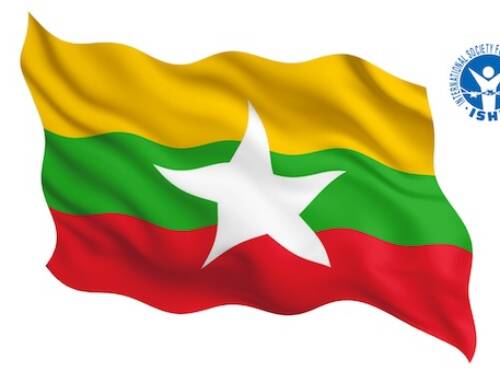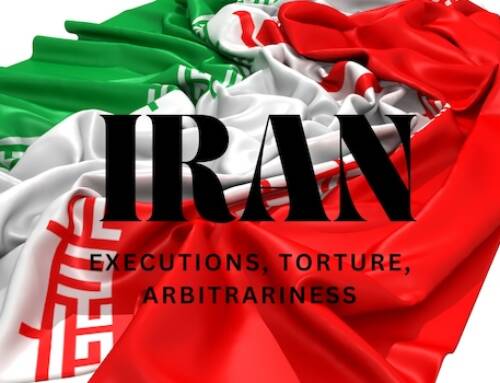
ISHR Lithuania – Humanitarian aid with a rich delegation program
There are currently 47,000 Ukrainian refugees in Lithuania, and every day there are about 150 more of them.
Small Lithuania, smaller than the German Free State of Bavaria, with a total population of less than 3 million, faces a serious humanitarian challenge. But the three small Baltic states are strong! And they understand Ukrainians like no one else.
Unforgettable was their 600-kilometre-long human chain between the three capitals – Tallinn, Riga and Vilnius, with which they demonstrated their independence on August 23, 1989. – The ISHR has supported them from the beginning until today with its heart and mind.
Here is a report of the visit of our small but energetic ISHR delegation in mid-April 2022.
Many Ukrainians have relatives in Lithuania. They receive 20 EUR per month per person as support, i.e. they depend on other support, e.g. from Caritas or the ISHR. Refugees receive €250 of one-off support, €115 for food and a food package once every two months. Clothing, shoes and so on can be obtained from Caritas. After two to four months, regulated social benefits come into effect. Ukrainian money is not exchangeable. Work is underway to establish a Ukrainian bank so that money can be exchanged. Completely destitute refugees receive 1,000 EUR from the government.
The well-established ISHR humanitarian aid team
The Baltic human chain for independence is unforgettable, especially for all those who were there at the time, such as Jurgita Samoskiene, the long-time chairwoman of the Lithuanian section of the ISHR, who was living and working in Germany for many years at the time, but whose heart led her back to her homeland.
It was therefore particularly gratifying to receive Katrin Bornmüller, Honorary Chairperson of the ISHR, who came from Germany, without whom decades of humanitarian aid work in Lithuania would not have been possible. As chairperson of the ISHR’s Wittlich working group, Katrin Bornmüller has already sent more than 500 large trucks of humanitarian aid, much of which was and still is sent for Lithuania.
Bornmüller was accompanied by Khalil Al Rasho from the ISHR office, head of Northern Iraq and Humanitarian Aid Department.
Visit to an old friend of the ISHR and co-founder of Sajudis
In addition to a busy work programme, a private visit to Sajudis co-founder Virgilijus Juozas Čepaitis, 85, a former member of the Lithuanian parliament, was naturally a top priority.

A rally in Vilnius Mountain Park to commemorate the 50th anniversary of the Molotov-Ribbentrop Pact. From left to right: Mečys Laurinkus, Vytautas Landsbergis, Kazimiera Prunskienė, Romas Gudaitis, Virgilijus Čepaitis, Bronius Genzelis and others. Vilnius, 22 August 1989. Photo by V. Gulevičius (ELTA) LCVA.

Visit to long-standing human rights defenders, Virgilijus Juozas Čepaitis and Katrin Bornmüller in the centre
Vilnius – Registration centre for Ukrainian refugees, Naujininkai Refugee Reception Centre, German Embassy
On April 22, representatives of the ISHR, together with officials from the Ministry of Interior, visited a URegistration centre for Ukrainian refugees in Vilnius.

Registration centre for Ukrainian refugees in Vilnius

From left to right: Katrin Bornmüller, Maxim Afanasiev – Senior Advisor to the International Cooperation Group and his assistant; Khalil Al Rasho.
“The way the Lithuanian government organised this is admirable. Ukrainians are hardworking people, many are already working, the employment centre was also represented at the centre. Many NGOs help with documents and residence permits, hand out food, refugees are allowed to spend 72 hours there. Most of them come because they have relatives in Lithuania and want to stay. A person is fingerprinted and photographed, then given a paper residence permit, a month later they receive a card. Ukrainians do not want to be a burden and want to work”.
Reception with the German Ambassador
On April 19, 2022, the German Ambassador, Mr. Sonne, and his deputy, Dr. Buschmann, met in Vilnius to discuss numerous topics and ideas concerning mutual support.

The Facebook page of the German Embassy in Lithuania reports on the ISHR and the meeting. From left to right: Al Rasho, Bornmüller, German Ambassador Matthias Sonn, Samoskiene
Refugee reception centre in the Naujininkai district in Vilnius
About 80 per cent of the residents here are from Iraq. Most of them are Kurds, followed by Arabs, Yezidis, Afghans and Syrians. According to the head of the institution, Gediminas Pocius, there have been and still are dangerous attempts to escape from the institution, such as from the infirmary, or when several families with babies have already tried to escape through the windows.
A migrant shelter in Rukla, 100 km north-west of the capital
There are currently 670 especially needy migrants living there. Pregnant women, the sick and disabled. Most of them were smuggled into Lithuania by Alexander Lukashenko, explained the friendly director of the institution, Beatrice Bernotine. Most of them are from Iraq, but also from Afghanistan, Africa and Syria. Among them are many Yezidis, as well as Christian refugees who have experienced terrible things at the hands of the IS. Nadia from Iraq was forced to watch her sister being shot by the IS fighters, and even now the IS is still threatening her with death. For nine months now, the status of the residents is still unclear. There is no canteen and people have to do their own shopping and cooking in large kitchens. 90 social workers look after people and accompany them when they go shopping. As in most refugee centres in Lithuania, there is a choice of courses available.

Rukla Migrant Centre, one more photo before moving on
Migrant centre in Pabrade
Fifty kilometres north-east from Vilnius, very close to the Belarusian border, the next visit was to a migrant shelter in Pabrade. Pabrade is a small former Soviet military town with a population of less than 6,000, whose old military facilities are now used as NATO training grounds. The migrant shelter in Pabrade has existed since 1997, a major crisis with people smuggled in May 2021, after which the Miadinikai and Kibarte were established as reception centres. Pabrade is home to asylum seekers and illegal migrants. The latter are not allowed to leave the facility. They have to apply for asylum and are provided with medical care. A doctor examines 20 patients a day and surgeries are performed if necessary. Sports activities are organised, English courses are offered and the Red Cross and Caritas provide balls, nets, puzzles…
“There are currently almost 700 refugees here. 145 Ukrainian refugees live in the dormitory of the local vocational school. Many Belarusians-refugees already have Lithuanian citizenship. All of them have to learn the Lithuanian language. Children from the migrant shelter attend general secondary schools. There are not enough places in kindergartens”.
Refugee reception camp in Medininkai
They visited the Medininkai refugee reception camp 40 km east from Vilnius on the border with Belarus for the second time.

Petras Austravicius (in centre), head of the Medininkai Refugee Reception Camp, accompanies the ISHR representatives
“Director Petras Austravicius is a good young officer. His grandfather lives in Cologne. There are 651 people living here, no children. People can learn trade. Courses in English, hairdressing and other professions are offered. Many associations offer leisure activities. If the asylum procedure is refused, the camp staff has to inform people, and this is very difficult. The ISHR raised the problem of interpreters, who often translate incorrectly, they are sent by the EU. There are also trust issues related to religion or ethnicity”.
Distribution Center for Refugees in Pasvalys
Pasvalys is located 180 km north from the Lithuanian capital, close to the Latvian border. A distribution centre for refugees from Biržai, Pasvalys and Panevėžys regions is located here. Ukrainian refugees are supported by the Social Welfare Administration. 500 families are accommodated in this region with Lithuanian families, farmers or vacant flats.
School facilities in Pandelis
This school in the Rokiskis region has long been supported by the ISHR. Most of the children in the first classes are from very poor backgrounds, according to one of the teachers at this school. The child aid is 70 euros per child and social aid is 100 euros. Children receive meals at school. Ukrainian children visit online lessons in Ukrainian, and at later stages also in Lithuanian or Russian.
Even teachers here have to pay for school supplies, including toilet paper and soap, for a salary of 800 euros. Essentials are distributed in school, but they stay in school as there is a risk that parents would otherwise sell them. 7 buses pick up school children in the morning.
Border triangle of Lithuania, Latvia, Belarus
Ignalina – the ISHR humanitarian aid warehouse in cooperation with Caritas
Together with Catholic priest Vydas Smagurauskas, a visit was made to Caritas in Ignalina and the ISHR humanitarian aid warehouse. For Caritas, women volunteers prepare food for children in need, among whom are many Ukrainian children. They then drove another 40 km eastwards to Tverjacius, a village right on the Belarusian border. Here a small delegation was allowed into the private rooms of very poor families, families who live, sleep and eat in the same room.

Small ISHR warehouse in Ignalina for humanitarian aid
Visit to the Mayor in Visaginas
Visaginas is home to the largest number of Ukrainian refugees. Here Mayor Erland Galaguz received the ISHR delegation and reported on the difficult situation on the ground. The city was founded in 1975 by the Soviet elite to build the Ignalina Nuclear Power Plant. It is still in operation today, but at a low capacity. Ethnic Russians made up about 55% of the population in 2005 (compared to an average of 6%); Belarusians were 10% and Ukrainians 6%, higher than average. Ethnic Lithuanians are a minority in Visaginas, about 16%. According to Galaguz, up to forty different nationalities live in the region. Even in Russian schools you have to take the final exam in Lithuanian. Most Ukrainians want to stay here, in Lithuania. Russian television is not broadcast, he said. Some time ago, an entire theatre company from Belarus fled to Visaginas. Today the town has only 19,000 inhabitants, whereas it used to have more than 30,000. There is a twin town in France and they would like to have a twin town in Germany.

City of Visaginas reports on the reception of the ISHR at City Hall
Orphanage in Visaginas
Here the appearance speaks for itself….

Bornmüller with orphans in Visaginas
Meeting with the Belarusian partner organisation of the ISHR “Nash Dom”, which is in exile

From right to left: Karach, Samoskiene and Bornmüller have long been considered as the ISHR women’s dream team 🙂
Finally, a personal meeting with Olga Karach (pictured right), chairperson of the well-known Belarusian NGO in exile, Nash Dom, was mandatory. Karach is being persecuted and threatened by Lukashenko’s dictatorial regime. Karach, Samoskiene and Bornmüller have long been considered the dream team of the ISHR.





